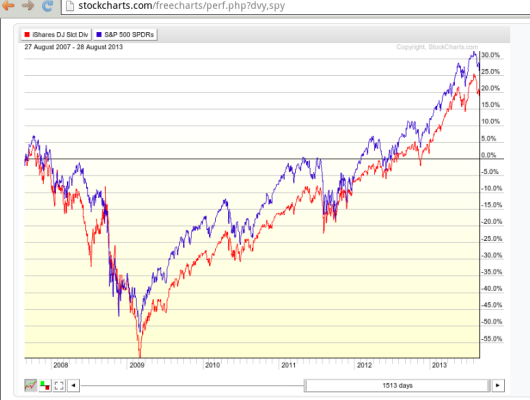Fair points but a true total return person would not have looked at the dividends from his index funds, or the income from their total bond market in Jan 2009 .
But once you are in the withdraw phase, you most likely have the divs/interest pour into an account that you spend from (at least from taxable accounts). So you may not be 'looking at them', but it would affect how much you need to withdraw each year.
Instead he would have said my AA has fallen from say 70/30 to 55/45 which would have been outside their bounds. Now maybe it is just me but it would have psychologically hard for me to just see the two numbers; total stock market index fund and total bond market index fund price. Sell 1/3 of the bonds, use some to pay bills, and the rest to buy stock funds. Now I am well aware that disciplined members of the forum did exactly that. I am curious what did you do during the crisis as far as rebalancing?
Well, it wasn't
quite such a crisis for me, since DW still works at a part-year job that covers ~ 1/3 ~ 1/2 of our spending, so my WD% is/was fairly low. But I did a bit of rebalancing then, moving from an intermediate bond fund to a high yield bond fund (I treat high yield as 50-50, beta is about half of SPY), so it did effectively move from bonds to equities. But I'm not putting much faith in rebalancing anyhow. Some of the reading and work I've done shows that gains are offset by selling on the way up in a multi-year bull market. Couple that with the relative insensitivity to AA we see in FIRECalc, and I'm likely to not do much rebalancing at all, other than maybe adjust when I need to sell something.
The real test would be between DW retiring and starting pensions/SS. That will likely be my highest draw-down phase. But that would only be a few years, and I could take SS/Pension early, though I hope that things look good enough (and 'not real bad' would be 'good enough') over the next decade that I can hold off on those.
You didn't even need to be a stock picker, a dividend fund would have achieved the same result.
Not completely I think volatility matters also and dividends stocks are less volatile than non dividend stocks. But what matters most is avoiding doing stupid financial things and I guess I am in favor of any approach that keeps people from doing stupid things like panic selling.
Yes, volatility matters. All things equal, no sane person would want a wild ride over a smooth one (roller-coaster and sky jumping fans excepted!). But I'm not so sure it's so easy to pick div stocks that are clearly less volatile. Here's DVY versus SPY (total return) from AUG 2007 to present, and they track pretty close. If you go back into 2000-2003 you'll see more divergence, but at least this latest swoop didn't create a huge disparity. That chart doesn't go back much further.
PerfCharts - StockCharts.com - Free Charts
(You need to manually set the slider for the time-frame)
I'm not really advocating one over the other, I think both can work fine. I'm not sure there really is a big difference. For me personally, I prefer the diversity of SPY, and we have the market history in FIRECalc as a reference. I don't think I can pick a div portfolio with FIRECalc, but it would be interesting.
-ERD50

